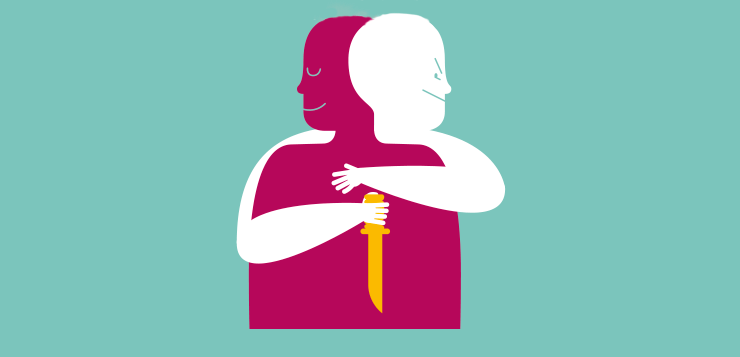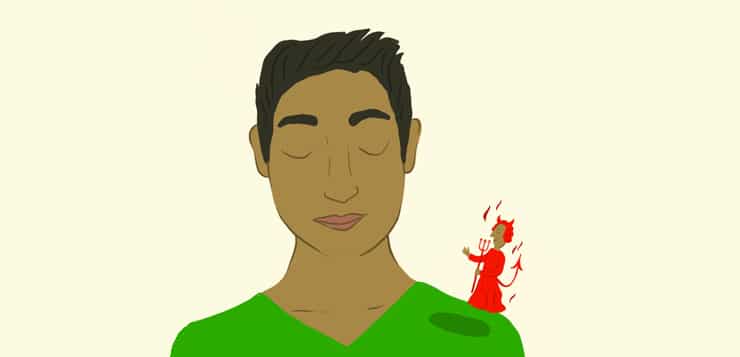This practice is really about communicating with the inner critic, and the first step is to catch that voice when it appears. We notice that the critic lives in a world of absolutes, with little room for nuance or gray areas. Her favorite words are should, always, and never, and blame is her operating system. “You’ve blown it, you always do.” “You should just give up.” “You’re so different, no one will ever love you.” “You’re so flawed, you’ll never be able to help yourself, let alone anybody else.” Instead of creating a wide and open space for embracing our lives, the inner critic causes us to question our worth and collapse in on ourselves.
For some, the inner critic is a specific voice from the past—your mother, your aunt, a child, the boss who fired you. My friend Joseph Goldstein still remembers the first-grade teacher who gave him a big red F in cutting and pasting. (This was in the days when you mixed flour and water to make paste, and Joseph’s work was apparently very messy.)
A friend or stranger may make an offhand remark that we take so deeply into our bodies and minds that they become part of our identities. And if the critical voices have been passed down “like family heirlooms,” the identification goes even deeper. I have a friend who hears the scornful voice of her long-dead mother—a woman who revered thinness above all human attributes—when she gains even a few pounds. Paradoxically, at times, such critical voices may even comfort us by linking us to our past and to the most important people in our lives. The judgments of those we loved or admired are part of our story, and, if we don’t spot them when they arise, they become the judgments we project on others, as well as ourselves.
Mindfulness helps us see the addictive aspect of self-criticism—a repetitive cycle of flaying ourselves again and again, feeling the pain anew. The inner critic may become a kind of companion in our suffering and isolation. As long as we judge ourselves harshly, it can feel as if we’re making progress against our many flaws. But in reality, we’re only reinforcing our sense of unworthiness.
Yet when we start to pay attention, we notice how quickly the critic jumps in, even when something good happens. If people befriend us, our critic may whisper that if they only knew how insecure and defective we are, they wouldn’t stick around for long. Or say you’ve just run a marathon. Are you celebrating the fact that you trained, ran, and finished? Or are you upbraiding yourself for being the last person to cross the finish line?
One student told me that shortly after the birth of her second child she went into a tailspin of self-judgment because her house was messy and she wasn’t keeping up her appearance or getting to the ironing. The noise of her self-abuse was so loud that it was more than a week before she realized she was comparing herself to her mother, a woman who always looked put together and kept a spotless home despite having two children—but she also happened to have a housekeeper who came in every day. Comparison is one of the critic’s favorite weapons. Luckily, mindfulness is so much wiser and more robust than our inner critic.
Meditation: Remembering your goodness
If you find yourself ruminating on the things you regret and the mistakes you’ve made, try this exercise. It will help you redirect your attention and remember goodness within. The point is not to deny your mistakes, but if you keep rehearsing them, analyzing them, creating stories around them, you’re simply reinforcing the pain and alienation they’ve already caused you. When you recognize and reflect on even one good thing about yourself, you are building a bridge to a place of kindness and caring. Standing in that place increases your ability to look honestly and directly at whatever is difficult and gives you the energy and courage to move forward.
When you recognize and reflect on even one good thing about yourself, you are building a bridge to a place of kindness and caring.
- Sit comfortably in a relaxed, easy posture and close your eyes. Now bring to mind one thing you have done or said recently that you feel was kind or good.
- It does not have to be newsworthy! Maybe you smiled at someone or listened to their story, maybe you let go of your annoyance at a slow checkout clerk, maybe you were generous, maybe you sat down to meditate, maybe you thanked a bus driver. It’s not conceit or arrogance to consider these things. It’s nourishing and replenishing to take delight in the good that moves through us.
- Or you might think of a quality or skill in yourself that you like or appreciate: perhaps you are enthused about helping others learn or committed to practicing patience toward your irascible neighbor.
- If you still find yourself caught up in self-criticism, turn your attention to the mere fact that you have an urge toward happiness. There is kindness and beauty in that. Or simply recall that all beings everywhere want to be happy, everybody wants to be happy.
- Never feel ashamed of your longing for happiness. Recall that this is your birthright. Seeking happiness is not the problem. The problem is that we often do not know where and how to find genuine happiness and so make the mistakes that cause suffering for ourselves and others. But that urge toward happiness itself is rightful, and when we support it with mindfulness, it can become like a homing instinct or a compass pointing us toward freedom.
If any impatience or judgments emerge during this meditation, don’t feel as though you have failed. This is entirely natural. Simply allow the negative reaction to ebb as a wave on the beach, and see if you can return to the positive contemplation without self-criticism.
Excerpted from the book Real Love by Sharon Salzberg. Copyright © 2017 by Sharon Salzberg. Reprinted with permission from Flatiron Books. All rights reserved.
Read more
Quieting Your Inner Critic
Are you too hard on yourself? Graduate student Steven Czifra spent most of his life behind bars. In this podcast, discover the research-tested practice that helped him quiet his inner critic.
Read More
A Mindfulness Practice for Forgiving Your Imperfections
Forgiveness is a unique form of nourishment, a way of providing ourselves and others a spaciousness around our conflicts and difficulties. Try this short meditation to help you let go and move on.
Read More










